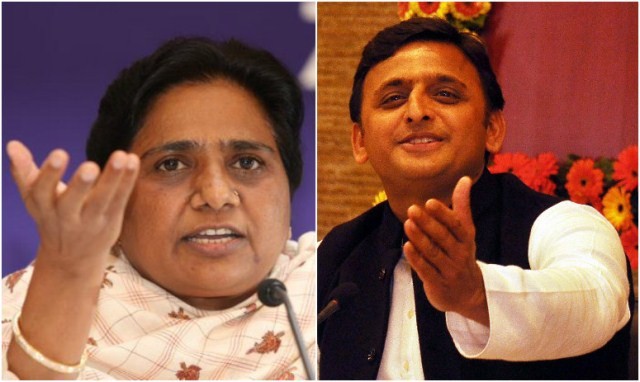
BSP founder Kanshiram once described the solidarity between Dalit and backward castes as a natural alliance – a step towards political and social justice. That was 1993, when Samajwadi Party and Bahujan Samaj Party had forged an electoral alliance for the first time.
But the alliance between the two parties has been anything but natural. For most of their histories, the two have contested against each other as arch rivals and their tryst with a coalition government was short lived, and ended in disaster.
It was the guest house incident of 1995, when chief minister Mayawati was attacked by SP goons in Lucknow that had called the curtains on the partnership.
Even on Saturday, she mentioned the incident numerous times, much to the embarrassment of Akhilesh Yadav, as she told her workers that she has not forgotten what transpired when BSP withdrew support from the Mulayam Singh government in the early nineties.
For more than two decades, BSP and SP competed as arch rivals in UP politics. Gone were the days when slogan of 'Mile Mulayam-Kanshiram, hawa main udd gaye Jai Shri Ram' had echoed in the air.
Instead, the state's political arena became a battle ground between the two outfits. As sharp caste polarisation defined the state’s politics, both BJP and Congress were left marginalised, leaving the political contest primarily between the two regional satraps.
But the political realities of the day have compelled the parties to come together against well entrenched and strong BJP, and two factors have helped cement the partnership.
One of course is the realisation that BJP as a political force has done such deep and well planned Caste re-alignment that fighting against it single-handedly would have been futile.
And second, the personal relation between SP president Akhilesh Yadav and Mayawati.
The change of guard within the Samajwadi Party has without a doubt been a big factor leading to the alliance. Political watchers say that the alliance would not have been possible if Mulayam and Shivpal had dominated the Samajwadi Party's affairs.
“The credit goes to the style of politics which Akhilesh practices. After becoming the chief minister in 2012, Akhilesh never made any insulting remarks against Mayawati. He always referred her as 'Bua Ji',” senior journalist Ram Dutt Tripathi says.
Lucknow University professor Sudhir Panwar says that the credit goes to both Akhilesh and Mayawati for understanding the people's pulse, rising to the occasion and burying the past.
“The SP-BSP alliance is primarily based on solidarity of the deprived castes Both Dalit and backward castes have been left disenchanted and annoyed with four and half years of Modi government and two years of Yogi Adityanath’s rule,” he says.
But the alliance would also have to fight off allegations of political opportunism. The BJP has already tried to project the gathbandhan as one formed due to compulsion and not based on ideology.
“Politics is practised on the basis of ideologies. Alliances are formed over a common vision. But this is the first time everyone is coming together against one person,” Prime Minister Narendra Modi said in his address in Delhi on Saturday, hours after Akhilesh and Mayawati’s alliance announcement.
For both the BSP and the SP, driving force has been political power. It was this aspiration which had led Mayawati to forge an “unnatural alliance” with upper castes, especially the Brahmins, in 2006. The slogan of ‘Hathi nahin Ganesh hai, Brahma Vishnu Mahesh hai' had then dominated the political discourse in the state.
Since then BSP has seen a gradual decline in electoral fortunes. For Akhilesh, too, the galvanising victory of 2012 gave way to the defeat in 2014 general elections and then the humiliating defeat in 2017 state elections.
Pushed to the wall by a resurgent BJP, the two regional parties had to seek an alliance. At the press conference, Mayawati tried to dismiss questions on whether the alliance would be compatible, and assured that it would last till 2022 state elections and beyond.
As SP lawmaker Sunil Singh Sajan put it, the two parties want to build a natural alliance of the 85 percent vs the 15 percent against the BJP as they would look to consolidate the Dalit, backward class and Muslim section votes.
The formula had worked the first time around, when Mulayam and Kanshi Ram had defeated the BJP at the height of the Ram Temple movement.
The success of this pact would similarly depend on the ability of the Akhilesh and Mayawati to transfer votes to each other.
The question remains if the textbook scenario will work or will the BJP be able to battle it out. There is also suspense over the 'Congress factor'. Excluded from the alliance, the party is likely to go it alone and its impact could determine course of the alliance


.jpeg)

